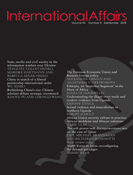-
Views
-
Cite
Cite
Xiaoyu Pu, Chengli Wang, Rethinking China's rise: Chinese scholars debate strategic overstretch, International Affairs, Volume 94, Issue 5, September 2018, Pages 1019–1035, https://doi.org/10.1093/ia/iiy140
Close - Share Icon Share
Abstract
In recent years, some Chinese elites have started to rethink the strategies and tactics of China's rise on the global stage. Some scholars see the problems in the West as strategic opportunities for China. However, others worry that Beijing might have taken steps too bold and too soon. This article aims to provide an updated analysis of the Chinese scholarly debate of strategic overstretch. Similar to the economics of cost–benefit analysis, strategic overstretch occurs if the cost of maintaining the existing system exceeds the benefits. Most Chinese scholars agree that China's policy community should pay more attention to the topic of strategic overstretch, while they disagree on the extent to which China already has such a problem. Designing and implementing a prudent grand strategy is an enduring challenge for Great Powers and Chinese scholars have taken different positions on the goals, means and time horizon of China's grand strategy. While we cannot claim that the Chinese scholarly debate has fundamentally changed China's foreign policy, there is a clear correlation between the emergence of a cautious voice in the academic world and the moderation of Chinese foreign policy—even as China continues to implement an ambitious foreign policy in a new era.





